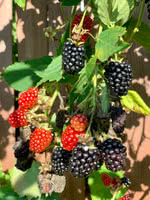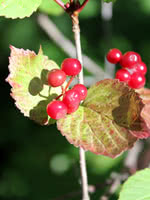Mon-Fri 9am - 5pm Mountain time
Lowbush Cranberry vs Balsors Blackberry
Rubus fruticosus Balsors
Viburnum edule
NOT AVAILABLE THIS SEASON - MIGHT RETURN
Balsors Blackberry is a cold-hardy variety that produces very large, sweet and juicy blackberries late in the summer. They are great for baking and fresh eating.
Balsors Blackberry is a floricanes, primarily fruiting on second year canes. Each spring cut back all two-year old canes, leaving only the last year’s growth. This is a self-pollinating variety, so it doesn’t require a second plant nearby to set fruit.
Lowbush Cranberry is a short, deciduous shrub native to North America. Its white flowers bear sour but edible fruit that ripens to a brilliant red in fall. Lowbush Cranberry's small size makes it suitable for urban use; buyers will also find it useful if trying to reclaim land back to its original species or when landscaping with native species in damp conditions.

